Published
- 16 min read
Will AI Replace DevOps Engineers? The Real Answer in 2025
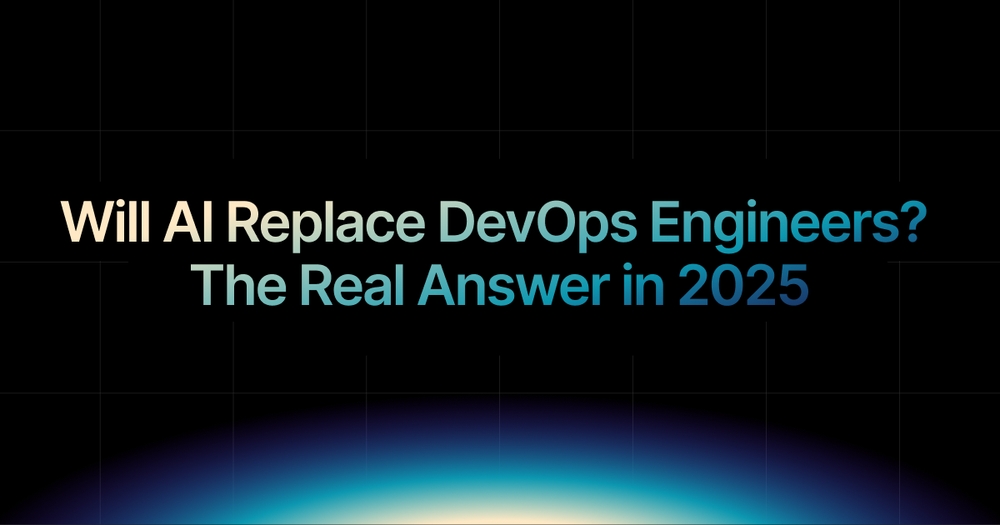
One of the hottest questions in tech circles today is simple but loaded: “Will AI replace DevOps engineers?”
If you search Google, ask ChatGPT, or scroll through Reddit threads, you’ll see the same debate play out again and again. Some argue that tools like AI-driven monitoring, auto-scaling, and predictive pipelines mean DevOps jobs are on the way out. Others believe DevOps is too deeply tied to strategy, security, and culture for machines to fully replace it.
The truth, as with most big technology shifts, lies somewhere in the middle. AI is not replacing DevOps engineers. It’s replacing repetitive DevOps tasks. And that’s a very big difference.
Think about what’s already happening in 2025:
- CI/CD pipelines can now be fully automated with AI assistance.
- Cloud providers like AWS and Azure are rolling out machine learning–based optimisation to reduce waste.
- AIOps platforms are being adopted by over 60% of large enterprises, according to Gartner’s 2025 outlook.
Yet even with all this progress, companies still need engineers who can design resilient systems, make judgment calls in complex incidents, and align technology with business goals.
As DevOps leader Gene Kim once said, “Automation doesn’t remove the need for people. It removes the need for people to do tedious work, so they can focus on the creative and important work instead”.
So instead of asking “Will AI replace DevOps?”
The real question in 2025 is: how will AI change the role of DevOps engineers, and how can businesses use it to ship faster and smarter without losing control?
Why Are People Asking if AI Will Replace DevOps?
 It’s no surprise that the question “Will AI replace DevOps engineers?” keeps trending on search engines and developer forums. The conversation isn’t just about technology. It’s about jobs, costs, and the future of how software gets built.
It’s no surprise that the question “Will AI replace DevOps engineers?” keeps trending on search engines and developer forums. The conversation isn’t just about technology. It’s about jobs, costs, and the future of how software gets built.
There are a few reasons this question has become so common in 2025:
- AI tools are moving fast. Platforms like Kuberns, GitHub Copilot, Jenkins AI plugins, and AIOps dashboards are showing that machines can handle build automation, test runs, and even error detection with little to no human input. According to a Statista survey, over 40% of DevOps teams are already experimenting with AI-based automation in their pipelines.
- Companies want to cut costs. With cloud bills soaring, businesses are under pressure to do more with smaller teams. If AI can optimize infrastructure or prevent downtime automatically, some executives see that as a way to reduce headcount. A McKinsey report in 2024 noted that AI adoption in IT operations could lower infrastructure costs by up to 30%.
- Headlines fuel the fear. Articles with titles like “AI will take your DevOps job” or “The rise of AIOps means no more ops engineers” get attention, but they rarely tell the full story. As Red Hat engineer Steve Abrams pointed out in a recent podcast, “AI isn’t eliminating roles; it’s shifting the skill set. DevOps engineers who understand AI will be more valuable, not less.”.
All of this creates a real tension: on one hand, the hype makes it look like AI could replace DevOps completely.
On the other hand, experts know that DevOps isn’t just a checklist of tasks. It’s about building resilient systems and bridging development and operations.
That’s why it’s important to separate what AI can automate today from what only skilled DevOps engineers can deliver, which we’ll dive into next.
What DevOps Tasks Can AI Already Replace in 2025?
One of the most common queries is: “What DevOps tasks can AI replace?” The answer isn’t “all of them,” but there are several areas where AI is already taking over repetitive, predictable work.
By 2026, the difference will be visible in CI/CD pipelines, scaling, monitoring, testing, and routine infrastructure management.
1. Automating CI/CD Pipelines
When developers ask, “Can AI replace CI/CD in DevOps?” the reality is that AI has already stepped in to remove much of the manual effort.
Instead of engineers writing custom scripts for every build, AI can:
- Analyse historical pipeline data to predict build failures before they happen.
- Automatically trigger test runs and select the right environments.
- Deploy updates with minimal human intervention.
For teams, this means faster release cycles and fewer late-night fixes. Instead of watching pipelines run, engineers can focus on improving workflows.
👉 Learn more: Best AI Tools for DevOps to Automate and Save Costs
2. Cloud Scaling and Cost Optimisation
A big query today is: “Will AI replace DevOps in cloud scaling?” The answer is that AI can already handle most of the operational side.
- Auto-scale servers up or down based on demand.
- Detect idle resources and shut them down automatically.
- Recommend or apply cost-saving adjustments, like instance right-sizing.
This has a direct impact on bottom lines. Companies using AI-based scaling see fewer wasted resources and more predictable monthly bills.
For startups and SMBs, this is often the difference between being able to afford a project or not.
👉 Related reading: Cut Cloud Costs by Using AI in DevOps
3. Monitoring and Incident Detection
Another question that comes up often is: “Can AI replace DevOps engineers in monitoring?” The answer is: yes, to a large extent. AI monitoring systems don’t just collect logs. They learn from them.
In 2025, AI is already able to:
- Spot anomalies in traffic and system performance.
- Correlate events across logs, metrics, and traces.
- Trigger alerts or even self-healing actions before downtime occurs.
This reduces the stress of 3 a.m. incident calls. DevOps engineers don’t disappear from the process, but they spend less time firefighting and more time building reliable systems.
👉 Explore: AI for DevOps: The Secret to Faster, Smarter Software Delivery
4. Automated Testing and Quality Assurance
Search queries like “Can AI replace manual testing in DevOps?” highlight how much time QA takes in the software delivery process.
AI is stepping in by:
- Generating new test cases based on code changes.
- Running parallel regression tests across multiple environments.
- Highlighting high-risk areas that need human review.
The result? Releases that are both faster and more reliable. Engineers don’t have to manually maintain endless test scripts. AI ensures the pipeline is always testing what matters most.
5. Routine Infrastructure Management
One area where DevOps teams always lose time is in routine provisioning and configuration. This includes spinning up servers, applying updates, and setting up containers.
AI can now:
- Automatically provision infrastructure based on project requirements.
- Apply security patches and updates without manual scheduling.
- Standardise configurations across environments, reducing errors.
This doesn’t mean infrastructure design is automated, but it does mean engineers no longer waste hours on repetitive setup work.
To summarise: AI in DevOps is already strong at automation, scaling, monitoring, testing, and infrastructure management. These are the areas where the question “Will AI replace DevOps?” has a partial yes as the answer, because AI replaces the tasks, not the engineer behind them.
What AI Still Can’t Replace in DevOps?
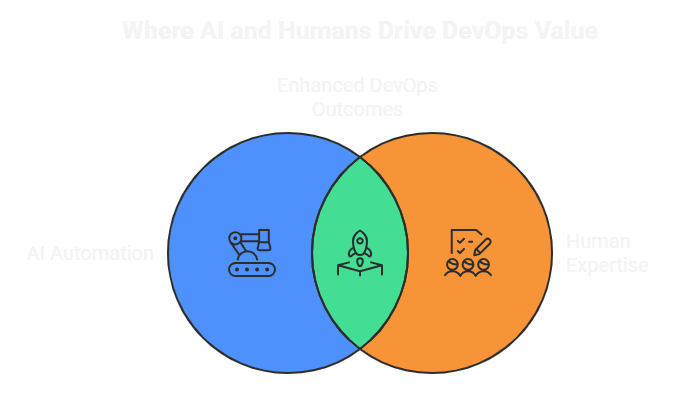 Even with all the progress in automation, the question “Can AI fully replace DevOps engineers?” still has a clear answer: no. That’s because DevOps isn’t only about pipelines and infrastructure. It’s also about strategy, culture, and aligning technology with business goals.
Even with all the progress in automation, the question “Can AI fully replace DevOps engineers?” still has a clear answer: no. That’s because DevOps isn’t only about pipelines and infrastructure. It’s also about strategy, culture, and aligning technology with business goals.
Here are the areas where AI, including the most advanced platforms, will not replace human engineers:
Strategic Architecture Decisions
AI can optimise and automate workflows, but long-term system design is a business-driven choice. Engineers decide how systems should evolve, which services to adopt, and how to balance cost, performance, and compliance.
Security and Compliance Leadership
AI can highlight vulnerabilities or suggest fixes, but compliance and governance require judgment calls. For industries like healthcare or finance, DevOps engineers ensure systems follow strict regulations and security standards.
Cross-Team Collaboration and Culture
DevOps was never just about automation. It’s about bridging development and operations teams. AI doesn’t drive culture change, mentorship, or accountability. Engineers remain essential in aligning people, tools, and processes.
Business Alignment and Innovation
One question we often see is: “Will AI replace DevOps roles in strategy?” The answer is no. AI automates delivery, but it can’t align IT priorities with business goals. Engineers play the key role of connecting technical execution with customer needs and long-term vision.
So instead of fearing that “AI will replace DevOps engineers”, the reality is this: AI removes the repetitive work, while humans focus on higher-value tasks.
That’s exactly the model platforms like Kuberns enable. Automation for the heavy lifting, and people for leadership and innovation.
Will AI Replace DevOps Jobs or Just Change Them?
 A big concern behind the query “Will AI replace DevOps jobs?” is whether engineers will still have a role in the future. The answer is clear: AI isn’t taking DevOps jobs away, it’s transforming them.
A big concern behind the query “Will AI replace DevOps jobs?” is whether engineers will still have a role in the future. The answer is clear: AI isn’t taking DevOps jobs away, it’s transforming them.
Here’s what that shift looks like in 2025:
From Operators to Strategists
Instead of spending hours writing scripts, managing clusters, or fixing broken builds, engineers are now guiding strategy and architecture. AI tools handle the repetitive execution, while DevOps engineers focus on how systems scale with business growth.
From Manual Fixes to Intelligent Oversight
AI-powered monitoring and deployment means fewer 3 a.m. alerts. Engineers don’t disappear from the loop. They oversee, validate, and refine AI-driven workflows. Their role is to ensure the automation aligns with company goals and reliability standards.
From DevOps to AIOps
The rise of AIOps (AI for IT operations) shows that roles are evolving. Instead of eliminating DevOps engineers, AI is creating a new skill set: engineers who can design pipelines and systems that work alongside AI.
Real-World Example: What Happens When AI Runs DevOps?
One of the top questions developers type into Google or ask AI tools is: “What would happen if AI replaced DevOps?”
The easiest way to answer is to imagine a real workflow, not years into the future, but what’s already possible in 2025.
Step 1: Developer Pushes Code
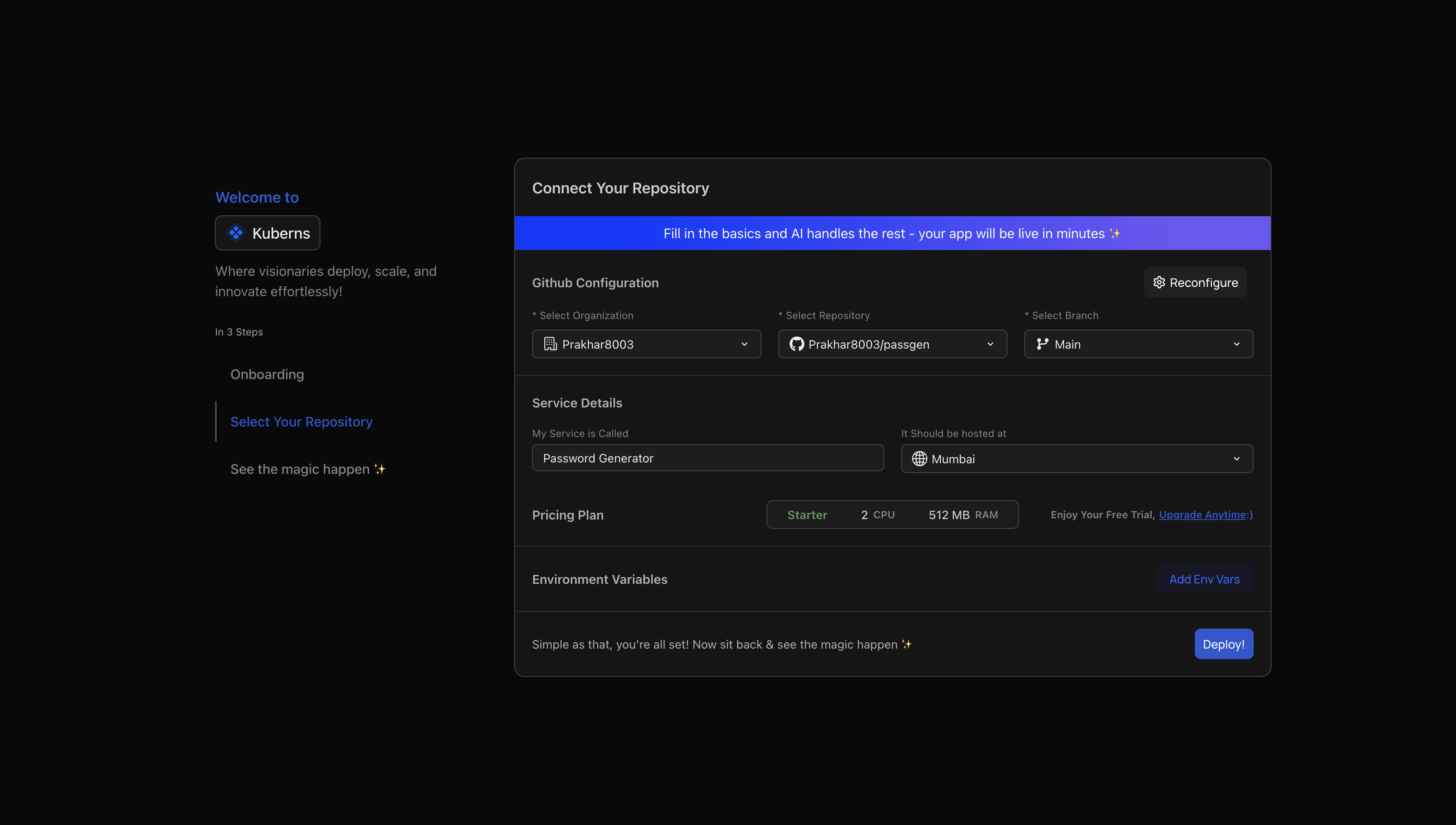 A developer finishes a feature and pushes code to GitHub. Traditionally, this would trigger a DevOps pipeline that needs custom scripts, YAML files, or manual approvals. But in an AI-driven pipeline, the process starts automatically.
A developer finishes a feature and pushes code to GitHub. Traditionally, this would trigger a DevOps pipeline that needs custom scripts, YAML files, or manual approvals. But in an AI-driven pipeline, the process starts automatically.
The AI detects the change, understands the context, and initiates the right build without an engineer writing new rules.
Step 2: Automated Build and Testing
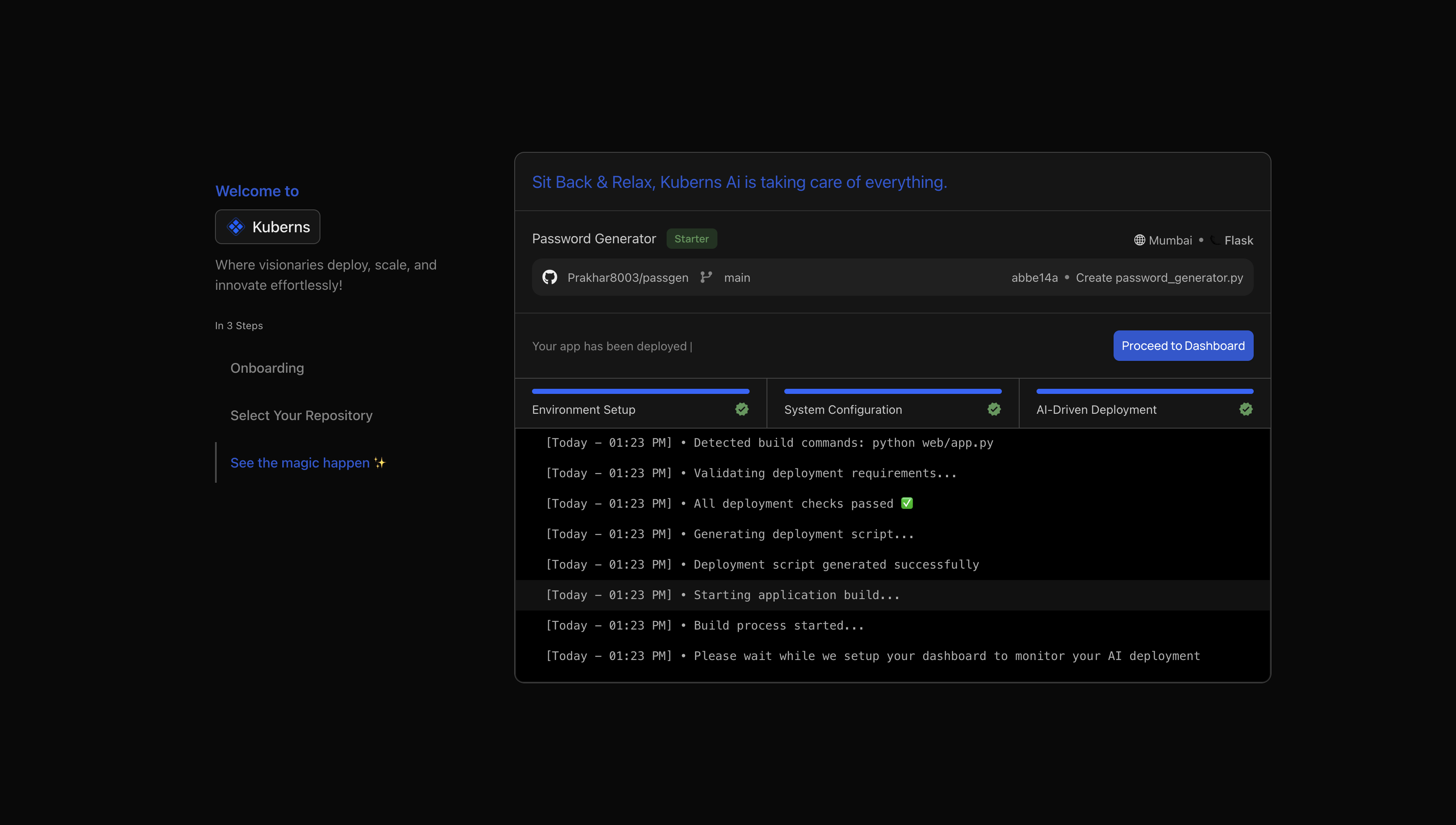 In a manual DevOps setup, builds fail often because of missing dependencies or inconsistent test coverage. With AI:
In a manual DevOps setup, builds fail often because of missing dependencies or inconsistent test coverage. With AI:
- The build system predicts potential errors using past deployment data.
- AI generates and runs test cases automatically, reducing human effort in QA.
- It flags any unusual patterns and warns the team before code hits production.
This means releases don’t slow down because someone forgot to update a script or add a test.
Step 3: Deployment Without Manual Scripts
In the old way, DevOps engineers write endless configuration files and Helm charts. With AI-powered deployment, all of that overhead disappears.
The system:
- Provisions infrastructure automatically.
- Chooses optimal deployment strategies (blue/green, canary, rolling updates).
- Applies consistent configurations across environments.
The engineer isn’t cut out of the loop, but they’re not spending hours maintaining boilerplate code.
Step 4: Monitoring and Self-Healing
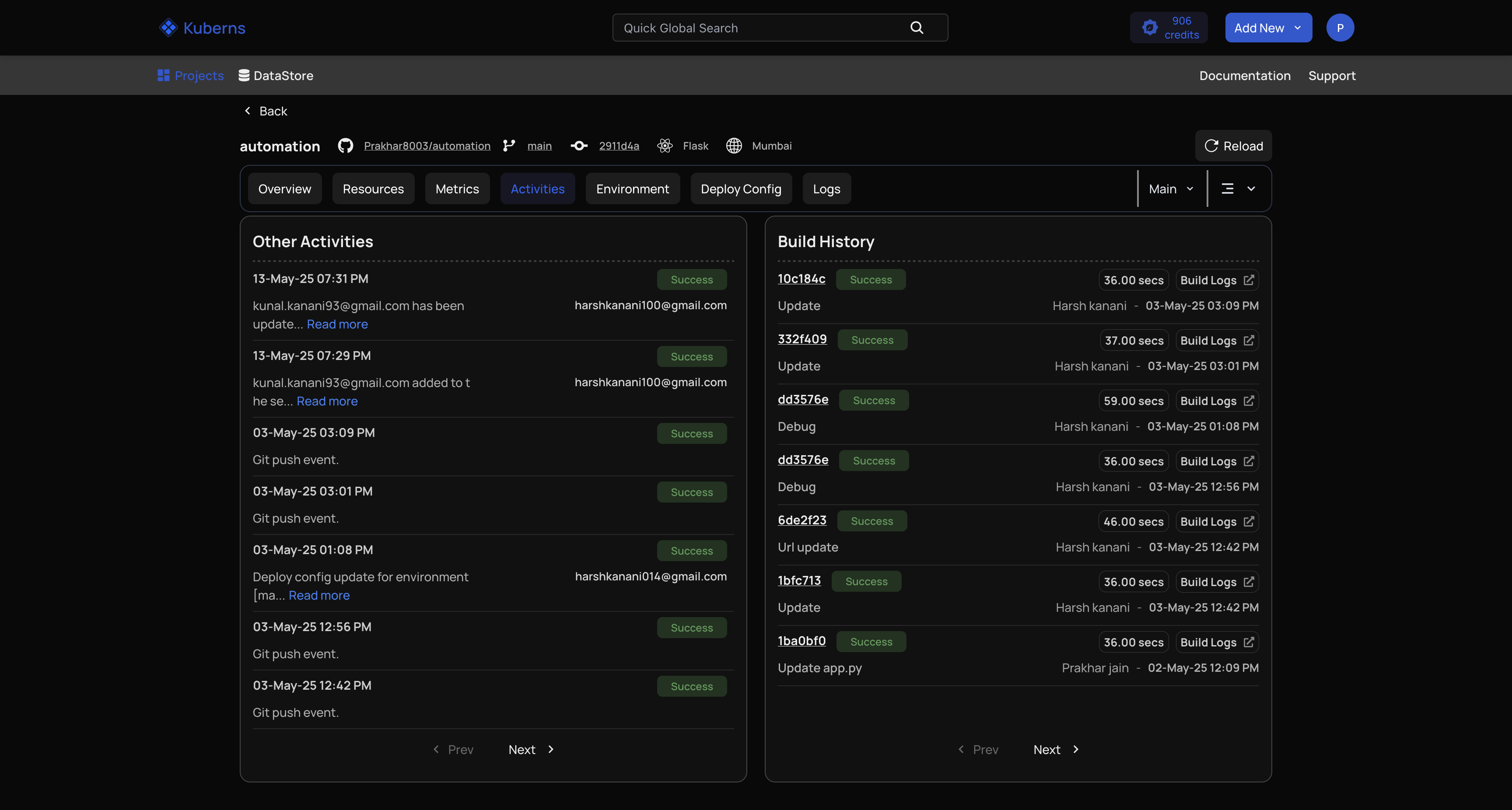 Here’s where the “AI replaces DevOps” conversation gets interesting. Monitoring has always been a pain point. Lots of alerts, lots of noise.
Here’s where the “AI replaces DevOps” conversation gets interesting. Monitoring has always been a pain point. Lots of alerts, lots of noise.
AI changes this by:
- Learning from historical logs and metrics.
- Detecting anomalies that humans might miss.
- Triggering self-healing actions, like restarting a container, scaling resources, or even rolling back a bad release.
The DevOps engineer doesn’t disappear. They step in only when the issue goes beyond patterns AI has seen before.
Step 5: Cost Optimisation in Real Time
Every company asks: “Can AI replace DevOps for cloud cost management?” The answer is mostly yes.
AI constantly analyses usage, spotting waste and shutting down idle servers before bills spike. For small teams, this can save thousands of dollars each month without needing a dedicated ops person watching dashboards.
Step 6: Developer Experience
The biggest shift isn’t just in the tasks AI replaces, it’s in how it changes the developer’s day.
Instead of waiting for ops approval, checking pipeline status, or worrying about cloud costs, the developer just pushes code. Everything else, build, test, deploy, monitor, optimise, happens automatically.
How Kuberns Brings This Future to You Today
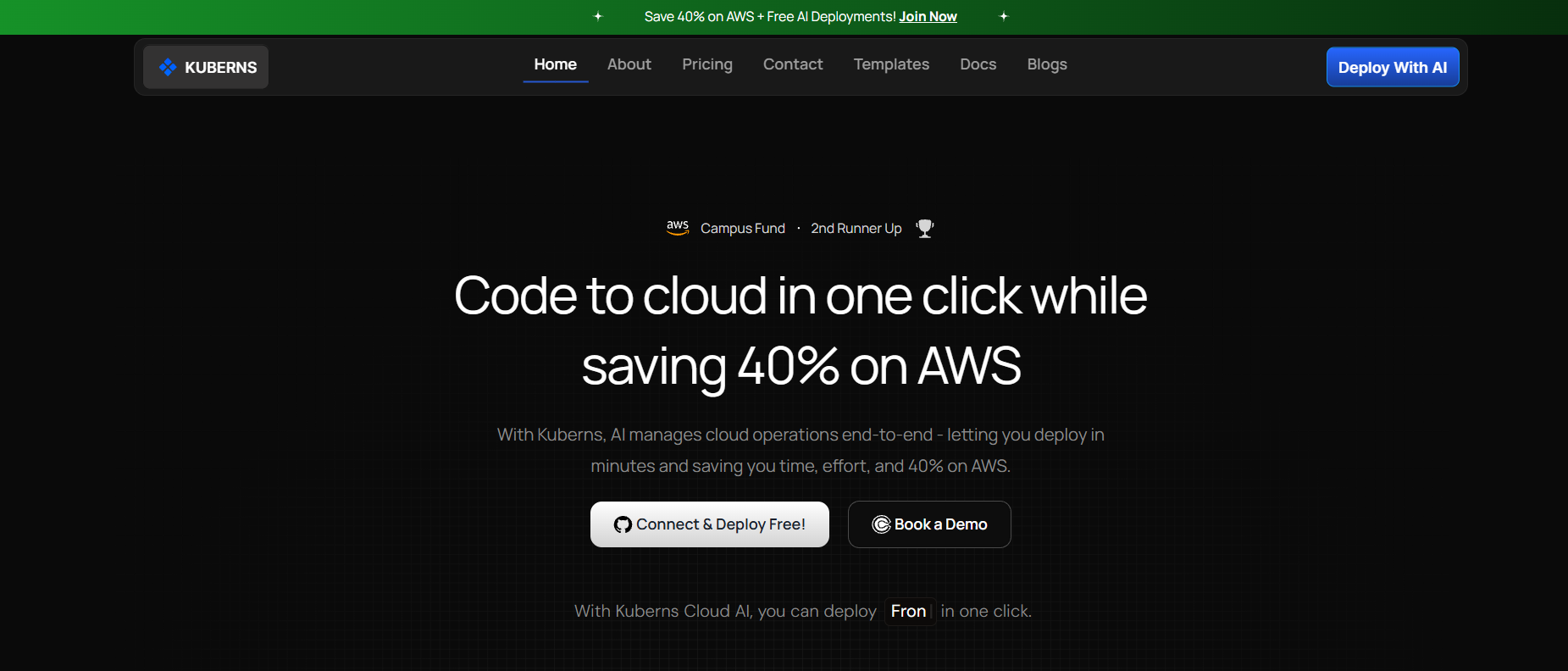 Many developers who ask “Will AI replace DevOps?” are really wondering: how can I get the benefits of AI-driven DevOps without rebuilding my whole workflow? That’s where Kuberns comes in.
Many developers who ask “Will AI replace DevOps?” are really wondering: how can I get the benefits of AI-driven DevOps without rebuilding my whole workflow? That’s where Kuberns comes in.
Instead of stitching together multiple tools for CI/CD, scaling, monitoring, and cost optimisation, Kuberns puts everything in one platform, powered by AI.
Here’s how it makes the idea of “AI replacing DevOps tasks” a reality today:
One-Click GitHub Deployments
Push your code to GitHub, connect it to Kuberns, and deploy in seconds. No YAML files, no Helm charts, no scripting. Just code → click → running app.
👉 Related: What is Kuberns? A Simpler Way to Build, Deploy, and Scale Apps
Built-in CI/CD Without Extra Tools
Forget maintaining Jenkins pipelines or managing GitHub Actions workflows. Kuberns has CI/CD built into the platform, so your app automatically builds, tests, and ships without a dedicated DevOps setup.
AI-Driven Auto-Scaling and Monitoring
Your app doesn’t just run. It adapts in real time. Kuberns automatically scales resources up or down based on traffic and monitors performance continuously. That means fewer outages, fewer late-night calls, and more predictable uptime.
40% Savings on AWS Infrastructure
Because Kuberns is built on optimised AWS infrastructure, you get the same reliability as AWS but with up to 40% lower costs. The platform’s AI ensures you’re never paying for resources you don’t use.
Zero-Hassle Setup, Full Transparency
No hidden platform fees, no vendor lock-in tricks. Just a simple, transparent workflow where developers and teams can focus on building features, not fighting infrastructure.
Final Answer: Will AI Replace DevOps Engineers in 2025?
So, back to the original question: will AI replace DevOps engineers?
The clear answer in 2025 is no, but it will continue to replace many of the manual, repetitive tasks that used to define the role. Pipelines, scaling, monitoring, and cloud cost management can now be automated by AI-powered platforms. But the strategic, cultural, and business-facing responsibilities of DevOps engineers remain essential.
In other words:
- AI is removing the grunt work.
- DevOps engineers are shifting to higher-value roles, focusing on system design, compliance, security, and innovation.
- Companies that adopt AI-powered platforms like Kuberns are already seeing these benefits: faster deployments, fewer failures, and major cost savings.
Instead of fearing that AI will “replace” DevOps, the smarter perspective is this: AI gives DevOps engineers more leverage, not less.
Ready to See AI Handle Your DevOps?
If you’ve made it this far, you already know the answer: AI won’t replace DevOps engineers, but it will replace the manual work that slows teams down.
The fastest way to experience that shift is with Kuberns.
- Deploy from GitHub in one click.
- Skip manual CI/CD setup.
- Let AI scale, monitor, and optimise your apps.
- Save up to 40% on AWS infrastructure.

FAQs
1. Will AI replace DevOps engineers completely?
No. AI can automate pipelines, monitoring, and scaling, but DevOps engineers are still needed for system design, security, compliance, and team culture. AI replaces tasks, not the role itself.
2. Which DevOps jobs are most impacted by AI?
Roles that focus heavily on manual tasks, such as infrastructure provisioning, pipeline setup, and routine monitoring, are the most affected. These jobs evolve rather than disappear, shifting toward oversight and strategy.
3. Is DevOps still a good career in 2025?
Yes. DevOps remains one of the fastest-growing tech fields. Engineers who understand how to work with AI-powered tools are even more valuable, since they combine automation skills with strategic thinking.
4. What is AIOps, and how does it relate to DevOps?
AIOps (Artificial Intelligence for IT Operations) uses AI to manage logs, events, and system performance. It complements DevOps by reducing manual firefighting and allowing engineers to focus on higher-level decisions.
5. Can Kuberns replace a DevOps team?
For many startups and small teams, yes. Kuberns automates CI/CD, scaling, monitoring, and cost optimisation in one click. Larger companies use Kuberns to free their DevOps engineers from repetitive tasks so they can focus on strategy and innovation.